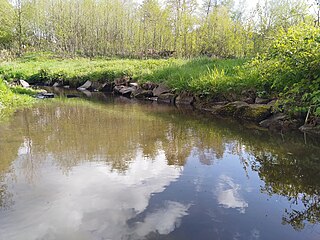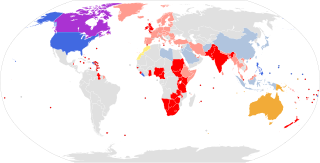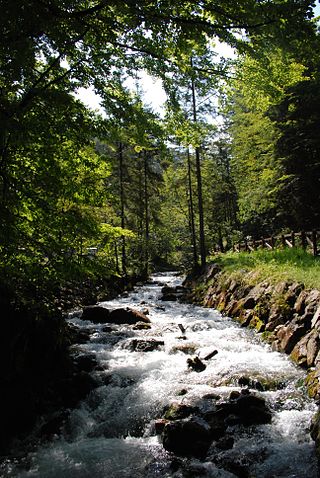
The Oxford English Dictionary (OED) is the principal historical dictionary of the English language, published by Oxford University Press (OUP), a University of Oxford publishing house. The dictionary, which published its first edition in 1884, traces the historical development of the English language, providing a comprehensive resource to scholars and academic researchers, and provides ongoing descriptions of English language usage in its variations around the world.

The Norsemen were a North Germanic linguistic group of the Early Middle Ages, during which they spoke the Old Norse language. The language belongs to the North Germanic branch of the Indo-European languages and is the predecessor of the modern Germanic languages of Scandinavia. During the late eighth century, Scandinavians embarked on a large-scale expansion in all directions, giving rise to the Viking Age. In English-language scholarship since the 19th century, Norse seafaring traders, settlers and warriors have commonly been referred to as Vikings. Historians of Anglo-Saxon England distinguish between Norse Vikings (Norsemen) from Norway, who mainly invaded and occupied the islands north and north-west of Britain, as well as Ireland and western Britain, and Danish Vikings, who principally invaded and occupied eastern Britain.

Bocage is a terrain of mixed woodland and pasture characteristic of parts of northern France, southern England, Ireland, the Netherlands, northern Spain and northern Germany, in regions where pastoral farming is the dominant land use.

Hottentot is a term that was historically used by Europeans to refer to the Khoekhoe, the indigenous nomadic pastoralists in South Africa.
Medieval studies is the academic interdisciplinary study of the Middle Ages. A historian who studies medieval studies is called a medievalist.

Perry Barr is a suburban area in north Birmingham, in the county of the West Midlands, England. It is also the name of a council constituency, managed by its own district committee. Birmingham Perry Barr is also a parliamentary constituency; its Member of Parliament between 2001 and 2024 was Labour's Khalid Mahmood. The MP as of July 2024 is Ayoub Khan, who ran as an Independent.

A body of water or waterbody is any significant accumulation of water on the surface of Earth or another planet. The term most often refers to oceans, seas, and lakes, but it includes smaller pools of water such as ponds, wetlands, or more rarely, puddles. A body of water does not have to be still or contained; rivers, streams, canals, and other geographical features where water moves from one place to another are also considered bodies of water.
Folk etymology – also known as (generative) popular etymology, analogical reformation, (morphological)reanalysis and etymological reinterpretation – is a change in a word or phrase resulting from the replacement of an unfamiliar form by a more familiar one through popular usage. The form or the meaning of an archaic, foreign, or otherwise unfamiliar word is reinterpreted as resembling more familiar words or morphemes.

Tzimmes, or tsimmes, is a traditional Ashkenazi Jewish stew typically made from carrots and dried fruits such as prunes or raisins, often combined with other root vegetables.

An Alice band is a type of hair accessory. It can consist of flexible horseshoe-shaped plastic or elastic material forming a loop. The band is designed to fit over the head and hold long hair away from the face, but let it hang freely at the back.

Despite the various English dialects spoken from country to country and within different regions of the same country, there are only slight regional variations in English orthography, the two most notable variations being British and American spelling. Many of the differences between American and British or Commonwealth English date back to a time before spelling standards were developed. For instance, some spellings seen as "American" today were once commonly used in Britain, and some spellings seen as "British" were once commonly used in the United States.

The destrier is the best-known war horse of the Middle Ages. It carried knights in battles, tournaments, and jousts. It was described by contemporary sources as the Great Horse, due to its significance.
Edmund S. C. Weiner is the former co-editor of the Second Edition of the Oxford English Dictionary (1985–1989) and Deputy Chief Editor of the Oxford English Dictionary (1993–present). He originally joined the OED staff in 1977, becoming the dictionary's chief philologist.

Rainow is a village and civil parish in Cheshire, England, in the valley of the River Dean and next to the B5470 road between Macclesfield and Kettleshulme. It straddles the eastern side of the Peak District border of Derbyshire and Cheshire, and is surrounded by pasture farmland. The Peak District Boundary Walk runs past the village. The village's name comes from the Old English hræfn + hōh, meaning "hill-spur frequented by ravens". It is a former mill village and has a population of around 2,500.

Lexico was a dictionary website that provided a collection of English and Spanish dictionaries produced by Oxford University Press (OUP), the publishing house of the University of Oxford. While the dictionary content on Lexico came from OUP, this website was operated by Dictionary.com, whose eponymous website hosts dictionaries by other publishers such as Random House. The website was closed and redirected to Dictionary.com on 26 August 2022.
In the Middle Ages, a commandery was the smallest administrative division of the European landed properties of a military order. It was also the name of the house where the knights of the commandery lived. The word is also applied to the emoluments granted to a commander. They were the equivalent for those orders to a monastic grange. The knight in charge of a commandery was a commander.

A stream is a continuous body of surface water flowing within the bed and banks of a channel. Depending on its location or certain characteristics, a stream may be referred to by a variety of local or regional names. Long, large streams are usually called rivers, while smaller, less voluminous and more intermittent streams are known as streamlets, brooks or creeks.
A scratch team is a team, usually in sport, brought together on a temporary basis, composed of players who normally play for different sides. A game played between two scratch teams may be called a scratch match.
Iatrosophia is a genre of Greek medical literature, originating in Byzantium. It comprises medical handbooks containing recipes or therapeutic advice, but the term can also be used of orally transmitted medical knowledge.














